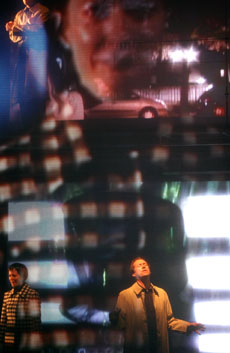New rock opera challenges corporate structure

Writer, arranger, and producer Mikel Rouse, bottom right, and actors rehearse The End of Cinematics at the Krannert Center for the Performing Arts on Thursday evening. Josh Birnbaum
September 9, 2005
While punk rock and alternative music are commonly heard pumping out of houses and apartments throughout campus, students can experience a unique form of music and live performance at the Krannert Center next weekend.
The third installment of the modern, multimedia operatic trilogy “The End of Cinematics” will premiere at 7:30 p.m., Sept. 17, at the Krannert Center for the Performing Arts.
Composer, producer and performer of the trilogy, Mikel Rouse, described the production as a 3-D film that has front and rear projection, surround sound and multimedia, IMAX-like entertainment.
Publicist Margaret Chaney described it as a rock opera.
“It’s a contemporary, multimedia production,” she said.
Get The Daily Illini in your inbox!
Rouse said the production is meant to be a meditation of corporate entertainment. According to “The End of Cinematics” Web site, the production reflects on the way corporate entertainment transformed the art of cinema. Rouse said it shows that there are different kinds of music and video outside the corporate media structure.
“I try not to manipulate an audience,” Rouse said. “If they walk away questioning the corporate model, that would be great.”
Chaney said “The End of Cinematics” also shows how people view the media. They take in a lot of information, flip channels while watching television and draw their own conclusions, she said. This is reflected in the fragmented forms of videos, multiple screens, live music, sound effects and surround sound of the production.
“The End of Cinematics” is the third opera of Rouse’s trilogy. Rouse began writing the first opera in 1989. Titled “Failing Kansas,” the opera premiered in 1995.
According to a press release by New York-based Sacks & Co. Inc., which manages the public image of major and debuting artists, the opera featured a solo performance by Rouse and pre-recorded voices in counterpoint to each other and Rouse’s own vocals. It was themed around the perception-altering and manipulative power of the media and the American approach to religion and spirituality.
Rouse said he began writing the second opera, “Dennis Cleveland,” in 1996, and it premiered in 2002.
According to the press release, Rouse transformed the structure of trash-talk television into an opera in this piece. Rouse played a talk show host, cast members were planted in the audience and the audience was featured on video monitors. The piece blended the lines between performance and reality in the same way some talk shows confuse personal confession with popular entertainment.
As for “The End of Cinematics,” Rouse said it took ten years to produce this installment. He said it took a long time because of its huge scale, set design and projectors.
The opera will premiere in the Playhouse Theatre of Krannert Center. Six video monitors will line the back wall of the stage, and a translucent scrim will run from the ceiling to the floor at the front of the stage. Cast members will perform on the stage and on an elevated platform, both between the monitors and the scrim.
Videos Rouse filmed in Paris will play on the monitors. These are edited to incorporate live performers, he said. People are cut out of the videos, and the performers, standing in front of the monitors, fill in, Chaney said.
Six performers, including himself, will play two main characters. Three men will play one character, and three women will play the other, Rouse said.
At a rehearsal Wednesday, the performers were dressed in costumes identical to the clothing worn by the characters in the video. Many times during the run-through of the production, the performers stood in front of the monitors, producing a 3-D effect where they appeared to be part of the videos.
In addition to portraying the video’s characters, the performers will sing and sign to the music played throughout the production.
Some of the music has a contemporary sound, while some sounds like popular music and even retro-sounding music. Rouse said he incorporated the retro-sounding music because the corporate structure of entertainment likes to rehash retro music.
Rouse said a recording of the opera’s music will be released this week and can be purchased on iTunes. In addition, two new albums unrelated to the trilogy were released September 6. “Test Tones” is an audio album and “Music for Minorities” is a CD/DVD two-disc set.
Public Information Director at Krannert Center Tammey Kikta said tickets can be purchased at the Krannert Ticket Office at 500 S. Goodwin Avenue, at www.krannertcenter.com, by calling the ticket office at (217) 333-6280, by faxing (217) 244-7469, by e-mailing [email protected], or by mail. Tickets cost $10-18, Kikta said.






